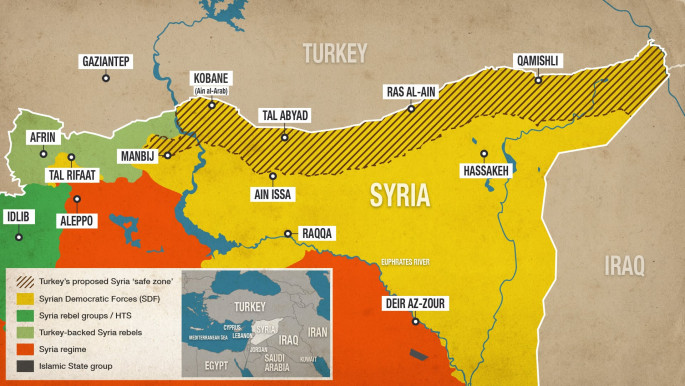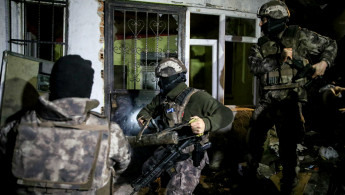Turkey detains four mayors in Kurdish areas during 'counter-terrorism operation'
Four mayors from Turkey's main pro-Kurdish opposition party were detained on Tuesday as part of a "counter-terrorism" operation, the party said.
They led councils in four towns in Turkey's majority-Kurdish southeast - Hakkari, Yuksekova, Ercis and Nusaybin - and are all members of the Peoples' Democratic Party (HDP).
State news agency Anadolu said they were taken as part of "counter-terrorism" investigations for alleged ties to the outlawed Kurdistan Workers Party (PKK), which has fought a bloody insurgency against the Turkish state since 1984.
Six other municipal officials were also arrested, Anadolu said.
Dozens of criminal cases have been opened against people around the country for criticising Turkey's military operation against Kurdish militants in Syria since it was launched a week ago.
Among them were the co-presidents of the HDP, Sezai Temelli et Pervin Buldan, accused of "terrorist propaganda" for statements against the offensive.
The government of President Recep Tayyip Erdogan has frequently accused the HDP of being a political front for the PKK, and has periodically cracked down on the party.
Its co-founder Selahattin Demirtas has been in jail since November 2016, and several of its mayors have been removed from their posts over alleged PKK ties.
The arrests come amid a deadly Turkish assault against Kurdish fighters in Syria, which has garnered international condemnation and concerns for human life.
Read more: Pro-Kurdish demonstrators clash with Turkish community in Germany
On Sunday, pro-Ankara fighters taking part in a Turkish offensive on Kurdish-held border towns in northeastern Syria allegedly "executed" at least nine civilians including a Kurdish female politician on Saturday, a monitor said.
"The nine civilians were executed at different moments south of the town of Tal Abyad," the Syrian Observatory for Human Rights said.
The Kurds said a political leader Hevrin Khalaf and her driver were among those killed.
Khalaf, 35, was "taken out of her car during a Turkish-backed attack and executed by Turkish-backed mercenary factions", the political arm of the Kurdish-led Syrian Democratic Forces (SDF) said in a statement.
"This is a clear evidence that the Turkish state is continuing its criminal policy towards unarmed civilians," it added.
Khalaf was the secretary-general of the Future Syria Party.
Kurdish activists circulated two videos on social media of the killings.
Read more: Some Syrians are fleeing Turkey's offensive, others are returning home
The first, posted on the Twitter account of the Ahrar al-Sharqiya rebel group, shows two people in civilian clothes kneeling on the ground as a fighter next to them announces they have been captured by the faction.
In the second, an unidentified fighter opens fire at a person on the ground wearing civilian clothing.
In a sign of confusion left by the Turkish operation, Ankara-backed Syrian rebels denied responsibility amid unconfirmed reports that Islamic State-linked cells could have been behind the ambush.
As the Turkish offensive continues on Tuesday, thousands of civilians are being displaced in areas east of the Euphrates, northern Syria, particularly in Tal Abyad and the northern Raqqa countryside.
This is despite the assurances of the Turkey-backed Syrian National Army (SNA) that fighters would not commit abuses against civilians and that the aim of the military operation is to expel the Syrian Democratic Forces (SDF) - dominated by Kurdish forces - from northern Syria.
The SNA and the Turkish army took control of Tal Abyad on Sunday, as part of the military operation against the SDF, but the campaign has led to mass displacement.
"People are displaced and are moving to the areas of Raqqa countryside," media activist Wissam al-Arabi told The New Arab.
"The internally displaced depend on relatives because of the clan dimension, and most of them manage this way at the moment. As for the numbers of displaced people there is no accurate estimates," he said.
Follow us on Twitter: @The_NewArab





 Follow the Middle East's top stories in English at The New Arab on Google News
Follow the Middle East's top stories in English at The New Arab on Google News
![Netanyahu furiously denounced the ICC [Getty]](/sites/default/files/styles/image_330x185/public/2024-11/GettyImages-2169352575.jpg?h=199d8c1f&itok=-vRiruf5)
![Both Hamas and the Palestinian Authority welcomed the ICC arrest warrants [Getty]](/sites/default/files/styles/image_330x185/public/2024-11/GettyImages-2178351173.jpg?h=199d8c1f&itok=TV858iVg)
